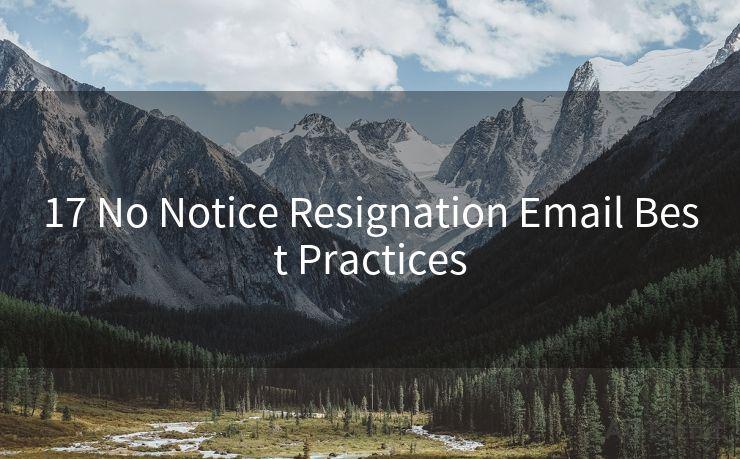17 No Notice Resignation Email Best Practices




When it comes to resigning from a job, providing notice is generally considered best practice. However, there may be situations where a no-notice resignation is necessary. In such cases, it's crucial to handle the resignation email professionally and tactfully. Here are 17 best practices for writing a no-notice resignation email:
1. Clear and Concise Subject Line
Start with a subject line that clearly states your intention to resign. For example, "Resignation Effective Immediately".
2. Formal Greeting
Begin your email with a formal greeting to your manager or HR representative, addressing them by their proper title and last name.
3. Direct Statement of Resignation
In the opening paragraph, state that you are resigning from your position effective immediately. Keep it brief and to the point.
4. Reason for No-Notice Resignation
While you're not obligated to provide a reason for your resignation, offering a brief explanation can help maintain professionalism. Keep it concise and avoid negative comments about the company or colleagues.

5. Express Gratitude
Thank your employer for the opportunities and experiences you've had during your tenure. This shows respect and professionalism.
6. Transition Assistance
Offer to assist in the transition of your duties to a successor, if possible. This demonstrates responsibility and consideration for your team and the company.
7. Forwarding Information
Provide contact information where necessary documents or work-related matters can be forwarded to you, if needed.
8. Avoid Burning Bridges
Maintain a positive tone throughout your email, avoiding any language that could be interpreted as hostile or negative.
9. Check for Grammar and Spelling
Proofread your email carefully to ensure there are no grammatical errors or spelling mistakes. Professionalism is key.
10. Use a Professional Email Signature
Include a professional signature with your full name, contact information, and any relevant links, such as your LinkedIn profile.
11. CC Relevant Parties
If necessary, consider carbon-copying (CC) relevant parties, such as HR or other team members, to ensure a smooth transition.
12. Attachments
If you have any relevant documents or files to pass on, attach them to the email.
13. Request Confirmation
Ask for a confirmation receipt to ensure your resignation has been received and understood.
14. Avoid Non-Professional Language
Stick to professional language and avoid colloquialisms or slang.
15. Send During Business Hours
Send your resignation email during regular business hours to ensure a timely response.
16. Follow Up
If you don't receive a response within a reasonable timeframe, follow up via phone or in-person.
🔔🔔🔔
【AOTsend Email API】:AOTsend is a Managed Email Service for sending transactional emails. Support Email Types: reminders, authentication, confirmations, notifications, verification codes, invoices, password resets, account activations, billing statements, two-factor authentication (2FA), and one-time passwords (OTP) emails, etc. $0.28 per 1000 Emails. 99% Delivery, 98% Inbox Rate.
You might be interested in:
Why did we start the AOTsend project, Brand Story?
What is a Managed Email API, How it Works?
Best 25+ Email Marketing Platforms (Authority,Keywords&Traffic Comparison)
Best 24+ Email Marketing Service (Price, Pros&Cons Comparison)
Email APIs vs SMTP: How they Works, Any Difference?
17. Keep a Copy
Save a copy of your resignation email for your records.
By following these best practices, you can ensure that your no-notice resignation email is handled in a professional and respectful manner, minimizing any potential disruption to your former employer while maintaining your own professional reputation. Remember, even in a no-notice situation, it's important to part ways gracefully.




Scan the QR code to access on your mobile device.
Copyright notice: This article is published by AotSend. Reproduction requires attribution.
Article Link:https://www.mailwot.com/p7082.html



